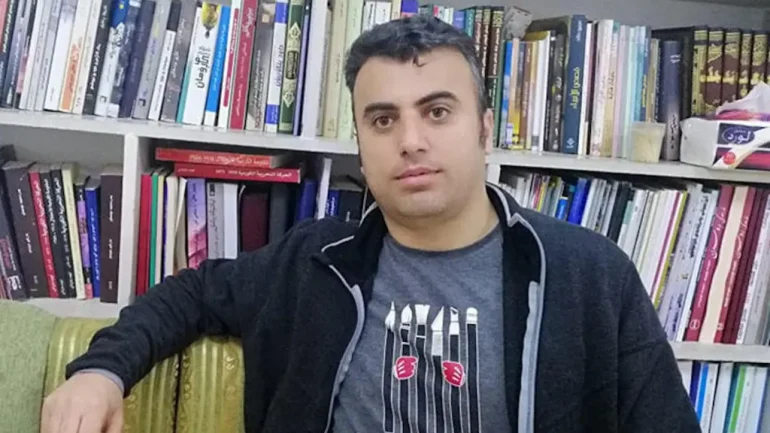International and local condemnation has poured in following the detention of Omed Baroshky, a journalist from Duhok, by security forces. The detainment is said to be in response to his criticism of a fresh four-year sentence handed down to fellow journalist Sherwan Sherwani by an Erbil court on Thursday.
The Iraqi Kurdistan branch of Community Peacemaker Teams (CPT), a US-registered NGO committed to nonviolent conflict resolution, stated on Twitter that Baroshky was “kidnapped” by a security force in Duhok due to his criticism of the Erbil Criminal Court’s resentencing of Sherwani.
Sherwani received a new four-year prison sentence from an Erbil court on Thursday based on new charges related to document falsification. He was already serving a six-year prison sentence over charges of posing a threat to national security. His case, along with those of four others from Duhok known as the Badinan detainees, has been widely criticized by both local and international organizations.
Following Sherwani’s resentencing on Thursday, his attorney stated in a press conference that the court’s decision is political and lacks any legal basis. Meanwhile, Baroshky made a pointed statement criticizing the Kurdistan Regional Government (KRG) PM, Masrour Barzani, for governing with a “military mindset.”
Ayhan Saeed, a representative of the Badinan detainees, posted on Facebook that a Duhok security force had “kidnapped” Baroshky at 12:30 am without presenting a court order.
Baroshky, who was arrested alongside Sherwani in 2020 during a rare anti-government protest over unpaid salaries in the Kurdistan Democratic Party (KDP) stronghold of Duhok, had previously spent 18 months in jail due to social media posts that were critical of the authorities in the Kurdistan Region.”
Outcry Over New Sentencing
As the KRG celebrates its four-year anniversary, boasting about its achievements, observers are becoming increasingly concerned that under PM Barzani’s tenure (who served as the Kurdistan Region’s spy chief before assuming leadership in 2019), freedom of expression rights have deteriorated.
The Committee to Protect Journalists (CPJ) has urged the KRG to immediately release Sherwani, drop all charges against him, and allow press members to work freely.
Sherif Mansour, CPJ’s Middle East and North Africa program coordinator based in Washington, D.C., said: “With the latest decision to extend Sherwani’s imprisonment by four years, the Iraqi Kurdish authorities are demonstrating to the world their willingness to act harshly against journalists.”
According to Ramazan Tartisi, Sherwani’s legal representative, Sherwani was accused of forging fellow imprisoned journalist Ghudar Zebari’s signature on a petition. Tartisi clarified that although Zebari was indeed in solitary confinement at that time, he had explicitly given Sherwani the authority to sign the petition on his behalf.
Sherwani received a 2.5-year sentence under Article 295, relating to the forgery of documents linked to debt or property. An additional 1.5-year sentence was levied under Article 298, which deals with the deliberate use of a forged document.
The New Generation Movement (NGM), the Patriotic Union of Kurdistan (PUK), and the Change Movement (Gorran) have all criticized the new sentencing. The NGM stated that the fresh sentencing and the abduction of journalists and activists are indicators of the ruling parties’ weakening grip on power. They added that “the anti-democratic and authoritarian behavior of the KDP is a dangerous alarm for the future of freedom and democracy in the Kurdistan Region. It is the duty of all political parties to strongly oppose it.”
Meanwhile, the PUK’s media department issued a statement expressing disappointment at the court’s decision, suggesting that such sentencing tarnishes the free speech environment in the Kurdistan Region. The PUK, currently at odds with the KDP, voiced the hope that courts would resist political influence and pressure, allowing for open discourse and criticism, and thus preventing further tarnish to the reputation of freedom of expression in the region.
Gorran said that the court’s decision, which extends a series of freedom-restricting measures, will negatively affect the region’s reputation and called for the decision to be overturned.
In 2021, the CPJ said Sherwani’s sentencing “is not only unfair and disproportionate, but it also demonstrates that the Iraqi Kurdistan regional government has finally given up the pretense of caring about press freedom.” The CPJ also criticized the trial, stating, “The case against Iraqi Kurdish journalists Sherwan Amin Sherwani and Guhdar Zebari was built on flimsy and circumstantial evidence, according to five observers at the journalists’ Erbil trial last month. Their six-year prison sentences on anti-state charges represent a new low for press freedom in Iraqi Kurdistan.”


